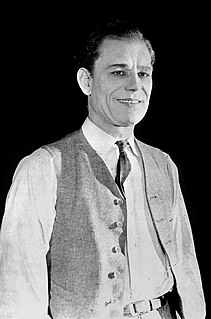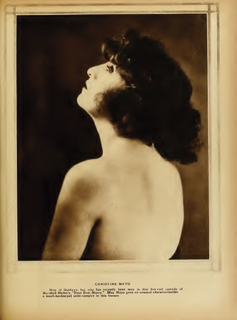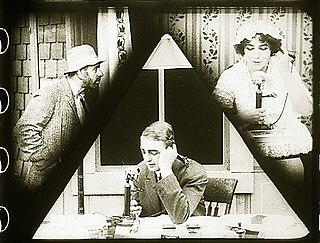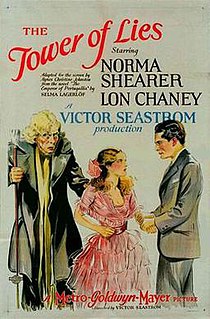
Leonidas Frank "Lon" Chaney was an American stage and film actor, make-up artist, director and screenwriter. He is regarded as one of the most versatile and powerful actors of cinema, renowned for his characterizations of tortured, often grotesque and afflicted characters, and his groundbreaking artistry with makeup. Chaney was known for his starring roles in such silent horror films as The Hunchback of Notre Dame (1923) and The Phantom of the Opera (1925). His ability to transform himself using makeup techniques he developed earned him the nickname "The Man of a Thousand Faces".

The Hunchback of Notre Dame is a 1923 American drama film starring Lon Chaney, directed by Wallace Worsley, and produced by Carl Laemmle and Irving Thalberg. The supporting cast includes Patsy Ruth Miller, Norman Kerry, Nigel de Brulier, and Brandon Hurst. The film was Universal's "Super Jewel" of 1923 and was their most successful silent film, grossing $3.5 million.

Thunder is a 1929 American silent melodrama film starring Lon Chaney and directed by William Nigh. The film has no audible dialogue but featured a synchronized musical score and sound effects. Thunder was Chaney's penultimate film appearance and his last silent film.

Christine Mayo (1883–1961) was a silent film actress.

Tell It to the Marines is a 1926 silent film starring Lon Chaney, William Haines and Eleanor Boardman, and directed by George W. Hill. The film follows a Marine recruit and the sergeant who trains him. It was the biggest box office success of Chaney's career and the second biggest moneymaker of 1926/1927.

The Unholy Three is a 1930 American Pre-Code melodrama directed by Jack Conway and starring Lon Chaney. Its plot involves a crime spree. The film is a sound remake of the silent 1925 film of the same name, with both films based on the novel The Unholy Three, by Tod Robbins.
The Honor of the Family is a 1912 American silent short drama film produced by the Rex Motion Picture Company. The film is a melodramatic one between two brothers and a woman named Marja. Gerald admires the girl and warns his visiting brother, Claude, to leave her alone. Infatuated, Claude and Marja secretly marry before Claude returns to England with a promise to return for her. As the months pass, Marja becomes broken-hearted and attempts suicide, but ends up crippled for life. Claude dies and Gerald cares for Marja, even forging a letter to keep her spirits up. Marja comes to love Gerald and all is revealed on a later date. The film was released on November 7, 1912. The film was claimed to be the debut of Lon Chaney, but this has been disputed. Lon Chaney: A Thousand Faces states that Chaney's film debut occurred after his wife's suicide attempt in April 1913, but notes the possibility existed during his unemployment in 1912. The film is presumed lost.
The Ways of Fate is a 1913 American silent short romance film produced by the American Film Manufacturing Company. The film's directorial and producer roles have been both attributed to Allan Dwan, but other sources point to Wallace Reid as director. The film's fictional plot is centered on Jim Conway, who grew up wanting to avenge his father's death and headed West to seek his father's killer. Lost in the mountains, he is saved by a young woman and the two fall in love. After a few weeks with her, Conway reveals the reason he came west and the young woman's father overhears it. The old man confesses to killing Conway's father, over a game of cards, and bares his chest. Conway refuses to take revenge, because love had diminished such feelings. The film was released on April 19, 1913 and it had a widespread national release. It is not known whether the film currently survives, but it is presumed lost.

Suspense is a 1913 American silent short film thriller directed by Lois Weber and Phillips Smalley. Weber also wrote the scenario and stars in the film with Valentine Paul. The film features early examples of a split screen shot and a car chase. The Internet Movie Database lists Lon Chaney as having an unconfirmed and uncredited brief role; however, this is disputed by silentera.com, which states "Despite attributions to the contrary, Lon Chaney does not appear in the film."
Almost an Actress was a 1913 American silent short comedy film directed by Allen Curtis and starring Louise Fazenda, Max Asher, Lon Chaney and Silvion de Jardins. A surviving still from the film shows Lon Chaney as the exasperated cameraman, grimacing in frustration as chaos envelops the film set. The film is now considered lost.

Bloodhounds of the North is a 1913 American silent short drama film directed by Allan Dwan and starring Murdock MacQuarrie, Pauline Bush, and Lon Chaney. The film is now considered lost. Some sources state the film was edited down to one reel and re-released theatrically in 1916 as The Accusing Evidence, but this is disputed.

The Honor of the Mounted is a 1914 American silent short drama film directed by Allan Dwan and featuring Murdock MacQuarrie, Pauline Bush, and Lon Chaney. The film is now considered lost.

The Tragedy of Whispering Creek is a 1914 American silent short Western film directed by Allan Dwan and featuring Murdock MacQuarrie, Pauline Bush, and Lon Chaney. Chaney expert Jon Mirsalis says Chaney also wrote the screenplay, based on a story by Elliott J. Clawson, but the Blake book says the film's director Allan Dwan wrote the screenplay himself. A print exists in the Deutsche Kinematek film archive. A still exists which shows Chaney in his role as "The Greaser".

The Rescue is a 1917 American silent drama film written and directed by Ida May Park and starring Lon Chaney, William Stowell and Dorothy Phillips. The screenplay was based on a story by Hugh McNair Kahler. The film is today considered lost. A photo exists showing Lon Chaney in his role as Thomas Holland, a rare occasion when Chaney did not play a villain.

The Tower of Lies is a 1925 American silent drama film directed by Victor Sjöström based upon Selma Lagerlöf's novel The Emperor of Portugallia (1914). Released one year after He Who Gets Slapped, the film marks the second collaboration between Sjöström, Lon Chaney and Norma Shearer. Also starring are William Haines, Ian Keith and Lew Cody.

Voices of the City is a 1921 American silent crime drama film starring Leatrice Joy and Lon Chaney that was directed by Wallace Worsley. It is considered to be a lost film.

The Light in the Dark is a 1922 American silent drama film directed by Clarence Brown and stars Lon Chaney.

The Singing Cowboy is a 1936 American Western film directed by Mack V. Wright and starring Gene Autry, Smiley Burnette, and Lois Wilde. Based on a story by Tom Gibson, the film is about a cowboy who decides to sing on television in order to raise money for the orphaned daughter of his former boss who was murdered.

The Gift Supreme is a 1920 American silent drama film starring Bernard Durning, Seena Owen, and Tully Marshall The film was written and directed by Ollie Sellers and based on the 1916 novel of the same name by George Allan England. The supporting cast includes Melbourne MacDowell, Eugenie Besserer, Jack Curtis, Anna Dodge, Claire McDowell and Lon Chaney in a villainous bit role.
Bondage is a 1917 American silent drama film written and directed by Ida May Park, and starring Dorothy Phillips, William Stowell, Gretchen Lederer and J.B. MacLaughlin.


















